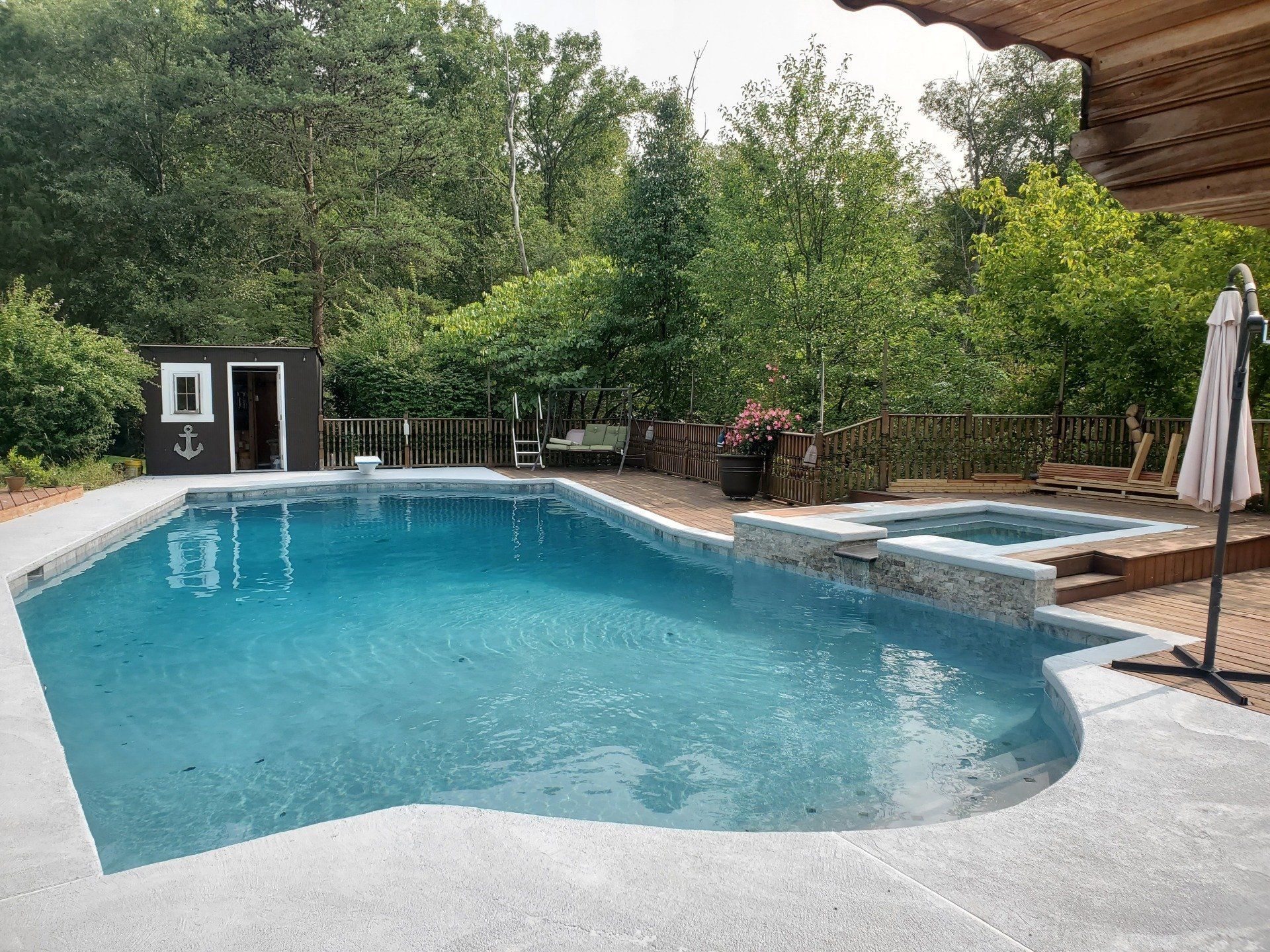Gunite Pools vs. Vinyl: Choosing the Right Pool for Your Home
Choosing to install a pool on your property is a fun and exciting decision! Before you inflate those pool loungers and tubes, it is important to do your research to ensure that you are choosing the right pool for your home.
Pools are a great way to boost the property value and functionality of your home. While they are an incredibly valuable asset, they are also a long-term commitment that should be well thought out before you make a purchase. A well-designed pool can instantly transform your home and yard into a personal oasis, providing a variety of options to kick back and relax, or to entertain your friends and family. With the right plan, a pool is a wonderful investment for your home, but how do you decide which pool is right for you?
Your first big decision will be this: gunite pools vs. vinyl.
Gunite and vinyl are the standard materials that are used to build pools today, and deciding which one would be best suited for your home comes down to a few key factors. In this article we will review some of the most important elements of each type of pool, and how to determine which would be best suited for your home and family.
Vinyl Pools
Vinyl pools are made with customized sheets of vinyl that line the interior of a pool. A vinyl sheet is placed over the concrete floor of the pool to provide a comfortable surface for swimmers to stand and walk on. Vinyl pool liners come in a variety of colors and designs, and provide lots of versatility.
The Pros
Many homeowners select vinyl pools because of their low upfront installation cost and their soft, smooth surfaces that are perfect for children or those with more sensitive feet.
They can be assembled to fit virtually any size or shaped pool, and can even be used to create unique features such as a bench, sun deck, or swim-out.
Vinyl pools also have a very quick turnaround time, and with a skilled craftsman, can be completed in just a couple of weeks. This is a good option for those who are looking to install a pool quickly and on a budget.
The Cons
While working with vinyl is a cost-effective way to install a pool, it does come with its fair share of disadvantages that should be taken into consideration.
Vinyl pool liners are more prone to damage and leaks, so it is important to treat your pool with care to extend its lifespan and reduce the need for extensive repairs. Even with the best care, vinyl pool liners will typically need to be replaced every 7-15 years, depending on the amount of activity it endures each year.
Pool owners should expect to spend approximately $5,000 to replace these liners, so while the upfront cost is lower, it is important to consider the ongoing cost of maintaining your pool.
Gunite Pools
Gunite pools are made using a mixture of concrete, water, and sand that is sprayed over the base of the pool. They offer unlimited options when it comes to shape, size, design, and interior finish. They are fully customizable to bring your dream pool to life.
Gunite pools can include bars, benches, and sun decks, and allow for lots of flexibility and versatility to suit your needs.
The Pros
Simply put, gunite pools are built to last. They can be fully customized using the materials and design of your choice, and are constructed using incredibly durable materials that can stand up to consistent use for many years. They provide the most longevity, and even come with the best warranties compared to their counterparts.
The sky is truly the limit when it comes to designing a gunite pool, which makes them a perfect investment for your forever home.
The Cons
While gunite pools are the most durable, flexible option, they are not suited for every family. One downside, depending on your budget, could be the upfront cost of installation. Gunite pools do have a significantly higher price point, but it is important to consider that you do get what you pay for. They are constructed for long-term use, and are made to stand up to harsher conditions and frequent use.
Gunite pools are not suitable for homeowners who are looking to have a pool up and running quickly. Since the concrete takes some time to fully cure before the builders can continue and complete the construction, gunite pools will require approximately one month to allow the molecules to bond together properly. While this can seem like an inconvenience, it will certainly pay off in the long run.
Care and Maintenance of Vinyl and Gunite Pools
Since areas such as Ohio, Kentucky, and Indiana experience cold winter climate, it is important to note that both vinyl and gunite pools can be winterized, which is an important step to protect your pool and extend its lifespan.
Like any other part of your home, both gunite and vinyl pools will require some upkeep and maintenance over time. No matter which material you use, maintaining the water chemistry is crucial for the health and safety of swimmers, and the integrity of the pool. Since gunite is slightly more susceptible to algae accumulation, it is important to use the appropriate chemicals to keep algae at bay.
Which Is the Better Option: Gunite of Vinyl?
Vinyl pools are a good option for families who are looking for a quick, cost-effective way to install a pool on their property. While they do come with a lower initial cost, it is important to consider that they are more prone to leaks and damage, and the vinyl liner will need to be replaced periodically, which will be an additional, ongoing expense.
While the upfront cost and turnaround time are higher than vinyl, gunite pools are built for longevity and durability.
While we are admittedly biased, they are well worth the investment and the additional time it takes for the materials to cure before the pool can be finished and used.

QUICK LINKS
GET IN TOUCH
Aladdin Pools
13076 Green Rd.
Walton, KY 41094
BUSINESS HOURS
- Mon - Fri
- -
- Sat - Sun
- Closed
ABOUT US
As a custom in-ground gunite pool builder, Aladdin Pools offers construction and service to residents of Cincinnati, Dayton, Lexington, Louisville and Northern Kentucky.
We understand the importance of an enjoyable experience in the designing, building and servicing of your swimming pool and swimming pool season.
All Rights Reserved | Aladdin Pools
Crafted by the Blue Guru

